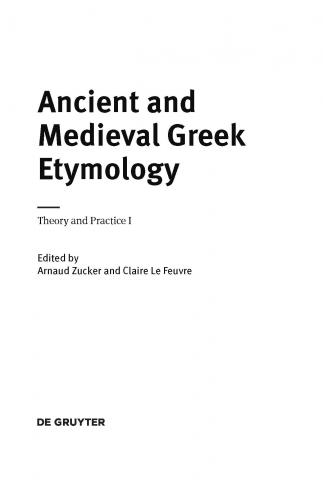ETYGR-Publications

Ancient and Medieval Greek Etymology. Theory and Practice II
Trends in Classics - Supplementary Volumes, 178
Edited by: Arnaud Zucker, Claire Le Feuvre, Maria Chriti
2015
This volume on ancient Greek synchronic etymology offers a set of papers evidencing the cultural significance of etymological commitment in ancient and medieval literature. It continues a collective work (begun in a first volume under the same title) of reflection on, and valorization of the significance, development and impact of the Greek etymologizing thought. The three sections illustrate the variety of approaches to the same object, which was much more than a technical way of studying language for Greek writers. Contributions focus on the functions of etymology as they were intended by the authors according to their own aims. The wide range of genres and authors and the interplay between theoretical reflection and applied practice demonstrate the importance of etymology in Greek culture. The studies proposed here show how versatile the uses of etymology are in ancient texts, appearing both technical and inspired, literary and philosophical, serious and playful, lexicological and conceptual. Part of them deals with the link and difference between etymology and etiology. The work is of special interest to scholars on etymology in ancient Greek scholarship and on more general issues in lexicology, semiology, and folk-etymology.
Author / Editor information
Arnaud Zucker, Côte d’Azur University, Nice, France; Claire Le Feuvre, Sorbonne University, Paris, France; Maria Chriti, Aristotle University of Thessaloniki, Greece.
Ancient and Medieval Greek Etymology. Theory and Practice I
Trends in Classics - Supplementary Volumes, 111
Edited by: Arnaud Zucker and Claire Le Feuvre
De Gruyter, 01/2021
This volume on Greek synchronic etymology offers a set of papers evidencing the cultural significance of etymological commitment in ancient and medieval literature. The four sections illustrate the variety of approaches of the same object, which for Greek writers was much more than a technical way of studying language. Contributions focus on the functions of etymology as they were intended by the authors according to their own aims. (1) “Philosophical issues” addresses the theory of etymology and its explanatory power, especially in Plato and in Neoplatonism. (2) “Linguistic issues” discusses various etymologizing techniques and the status of etymology, which was criticized and openly rejected by some authors. (3) “Poetical practices of etymology” investigates the ubiquitous presence of etymological reflections in learned poetry, whatever the genre, didactic, aetiological or epic. (4) “Etymology and word-plays” addresses the vexed question of the limit between a mere pun and a real etymological explanation, which is more than once difficult to establish. The wide range of genres and authors and the interplay between theoretical reflection and applied practice shows clearly the importance of etymology in Greek thought.
Simone Beta (Università di Siena). Maria Chriti (Aristotle University, Thessaloniki). Christophe Cusset (Ecole Normale Supérieure, Lyon). Valentin Decloquement (Université Lille III). Andrea Filoni (Università di Milano). Claire Le Feuvre (Sorbonne Université). Daniel Petit (Ecole Normale Supérieure, PSL). Marco Romani Mistretta (Harvard University). Nathalie Rousseau (Sorbonne Université). Athanasios Vergados (Newcastle University)








